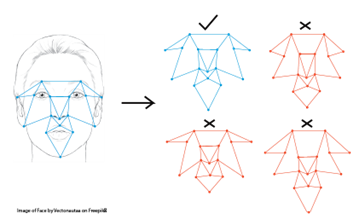This project will identify and explore the benefits, challenges and ethical concerns raised through the use of new computational technologies in policing. We will collect and analyse perspectives from police, civic and public stakeholders on Intelligent Facial Recognition and Predictive Policing.
The project was developed in collaboration with North Wales Police (NWP).
What is intelligent facial recognition?
Intelligent Facial Recognition uses biometric technologies that draw on algorithms to identify people in a video or a static image. There are different types of Intelligent Facial Recognition. For example, Retrospective Facial Recognition compares an image of an individual against a database of police custody images. Alternatively, Live Facial Recognition is performed ‘live’ and in real-time. Cameras record footage of people as they pass by which is immediately processed to attempt to identify specific people on a police watch-list.
There are different processes employed for facial recognition, but the most common involves the measurement of distances between key features on a person’s face. This is used to create a unique map of their face or ‘faceprint’. This ‘faceprint’ can then be compared to other stored faceprints to check for any likely matches.

What is predictive policing?
Predictive policing describes police work that draws on strategies, algorithmic technologies, and ‘big data’ to generate near-future predictions about people and places deemed likely to be involved in or experience crime. This might be used to create a risk score for an individual, predicting their likelihood of re-offending, or signalling a crime hotspot, indicating where and when officers should be deployed. It might also involve text analysis of intelligence logs and other sources of data to identify connections and further points of potential enquiry.
The broad use of these technologies may serve to reshape the relationship between the police and public in different ways, yet such developments have occurred without accompanying public engagement and debate. This is particularly true within the context of North Wales. The project seeks to address this lacuna by incorporating citizen perspectives and considering the use of the technology away from large urban centres and in rural settings.
Approach
To explore a range of perspectives, we are collecting data using the following methods:
- UK demographically representative survey
- Focus groups (purposively sampled to account for proportionality of impact) taking a Design Fiction approach (This article contains a short introduction to design fiction. You can also read this blog on how design fiction was used for to explore Emotional AI on a previous project
- Semi-structured interviews with NGOs/regulators
- Semi-structured interviews with active Police Officers and Staff.
- Observation of North Wales Police AI Governance group
Updates
We are currently in the data collection and analysis phase. Check back here for future updates and key findings. Question: will I be able to go in and make updates to the site once it is live? If not, is it possible to have a Twitter feed here? I’ll set up an account where I can post updates.
Impact
The project will produce a final report of direct relevance to North Wales Police, identifying practical and ethical concerns arising from police officers and wider public, and informing policy and guidance on Intelligent Facial Recognition. The findings will also be useful for police officers in all rural communities across Wales and wider UK, as well as Police and Crime Commissioners, Information Commissioners Office and privacy-oriented NGOs. By considering the under-researched Live Facial Recognition, this project is future-proofing ethical guidance on and understanding of public acceptability of such technologies
Project team
Bethan Loftus, Senior Lecturer in Criminology and Criminal Justice (PI)
Vian Bakir, Professor of Journalism and Political Communication (Co-I)
Martina Feilzer, Professor of Criminology and Criminal Justice (Co-I)
Andrew McStay, Professor of Digital Media (Co-I)
Alexander Laffer, Research Fellow
Final Report
Content coming soon
Design Fictions
Content Coming Soon
Workshops
Content coming soon
